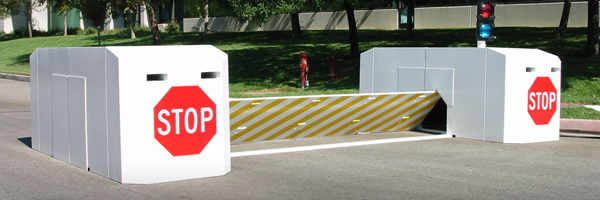What is available today in the industry of high security?
Since 9/11, the high security industry has exploded! Particularly in the fencing, gates, cable restraint, fixed barrier and access control industries. There are truly limitless options. However, to get you started in the right direction, we have listed a few of the most popular installations utilized today.
Vehicle Barriers: Vehicle barriers are categorized as either active or passive. Active and passive barriers can be fixed or movable, depending on how they are made, operated, or used. Some commercial barriers are dual-classified, when they meet the requirements for both categories (e.g., fixed-active, portable passive,etc.) There is no industry-wide standard terminology for vehicle barriers.
Active Barrier Systems: An active barrier requires some action, either by personnel, equipment, or both, to permit or deny entry of a vehicle. The system has some form of moving parts. Active barrier systems include barricades, bollards, beams, gates, and active tire shredders.
Passive Barrier Systems: A passive barrier has no moving parts. Passive barrier effectiveness relies on its ability to absorb energy and transmit the energy to its foundation. Highway medians (Jersey), bollards or posts, tires, guardrails, ditches, and reinforced fences are examples of passive barriers.
Fixed Barrier Systems: A fixed barrier is permanently installed or requires heavy equipment to move or dismantle. Examples include hydraulically-operated rotation or retracting systems, pits, and concrete or steel barriers. Fixed barrier systems can be either active or passive.
Portable/Movable Barrier Systems: A portable/movable barrier system can be relocated from place to place. It may require heavy equipment to assist in the transfer. Hydraulically operated, sled-type, barricade systems, highway medians, or filled 55-gallon drums that are not set in foundations are typical examples. Portable/movable barrier systems can be either active or passive.
Cable Restraint Systems: These are typically ¾” to 1 ¼” diameter cables installed at such a height to capture and stop a vehicle. Systems may be both certified and uncertified. Certified systems carry a K-Rating which boils down to how far a vehicle of specific size and weight traveling at a specific speed will stop once the vehicle has encountered the cables. The cables are strewn between posts to keep the system at a specific height. At specified lengths, the cables are terminated with the use of a deadman system.
Hydraulic Crash Bollards: These are steel bollards (posts) that can be recessed to ground level and rise in under three seconds to stop a vehicular threat traveling at an excessive speed. Able to work in conjunction with a simple three button station or sophisticated security system, the bollards are easily operated. You will find hydraulic bollards protecting our United States Embassies and Federal facilities throughout the United States and abroad.
Hydraulic Pop-Up Barriers: These are large immovable barriers that generally run the length of the drive. The barriers are at or below ground level designed to rise quickly in an effort to divert a vehicular threat traveling at excessive speeds. Once given a signal to rise, hydraulic pistons quickly raise the large steel road surface. These barriers can be easily installed on a temporary basis in under fifteen minutes.
Barrier Arm Gates: Much like a parking arm gate, these barrier gates rise and lower with a large tubular steel boom that has a cable assembly running through the tube. Once in the closed position, the cable automatically is looped over a large steel saddle horn. Again, these barrier arms are designed to stop a vehicular threat traveling at an excessive speed. These gate arms are available in electrical /mechanical or manual operation.
Crash Barrier Cantilever Gates: Designed to stop both foot traffic and vehicular threats traveling at an excessive speed, these gates are popular with airports that are concerned about anyone or anything approaching the aircraft. These gates require an electrical gate operator to move the gate at a speed of two feet per second to meet FAA requirements.
High Security Prison Gates: Prison fencing must be high, void of any gaps that allow penetration, and absolutely fool proof. TyMetal Corporation’s Plus System is the nation’s leading overhead track fully enclosed gate system used in today’s correctional facilities. Operated from a remote site, this gate with its unique locking column and fully enclosed track and chain assemblies, cannot be foiled by hands-on intervention.
Concertina Wire: The severe form of commonly know “razor wire,” concertina wire is used at almost every correctional facility and nuclear power plant throughout the United States. In a variety of diameters and types, this material is finding its way into the private sector as an impenetrable threat. Once used only in prisons, today’s criminals are unprepared to deal with this awesome threat. However, consideration must be given to public safety prior to installation.
Access Control: From fingerprints, retina scans, anti-passback, three strikes, tail gating; today’s access control devices are out of this world. With the use of a personal PC and telephone entry device you can not only decided if people can access your perimeter but how often and what time of the day. The options are limitless.
The options are limitless but the choice of contractors is not. We are your choice and we can prove it to you.
Click on our FAQ and Gallery links above to learn more about K-Rated Vehicle Restraint Systems fencing.

